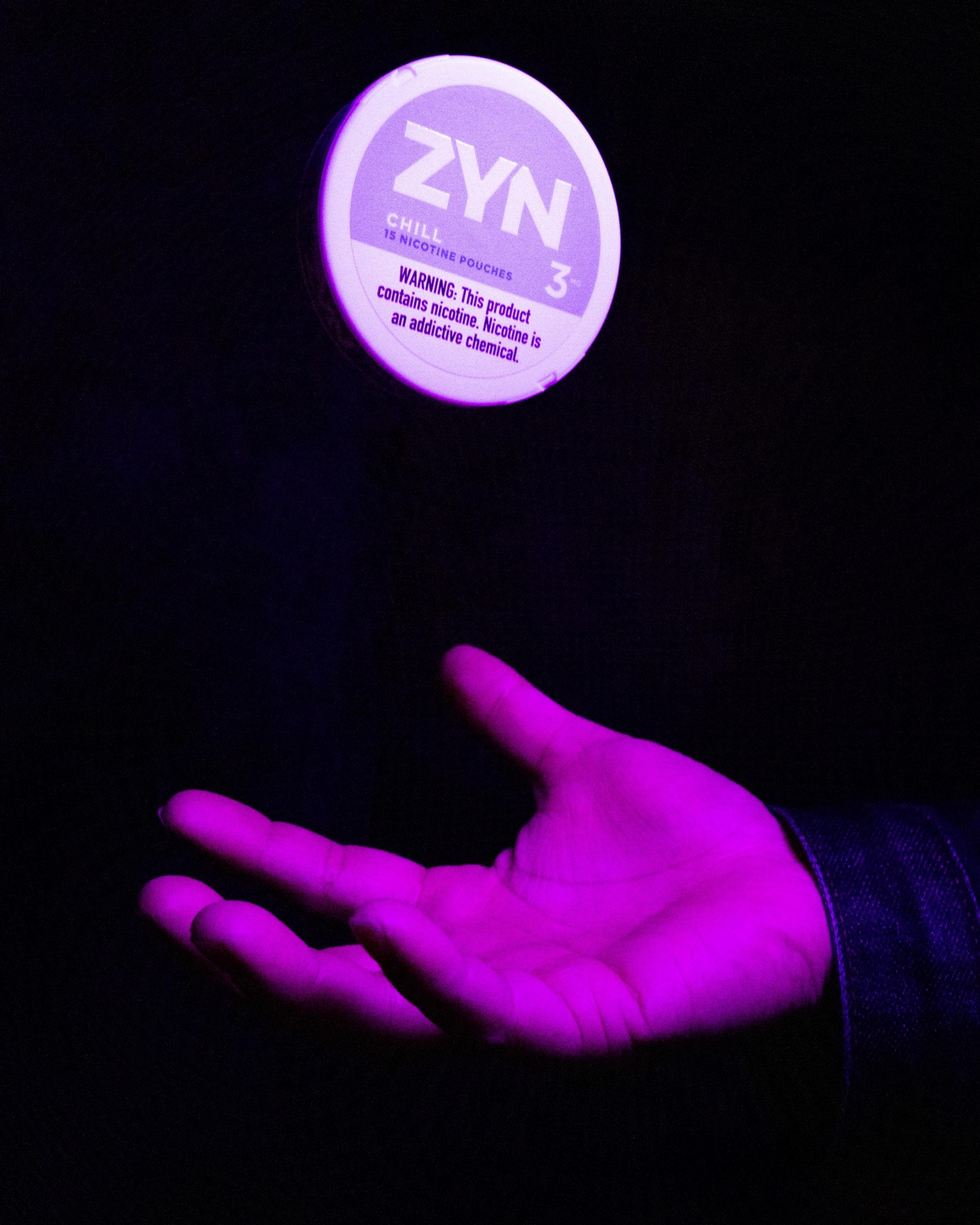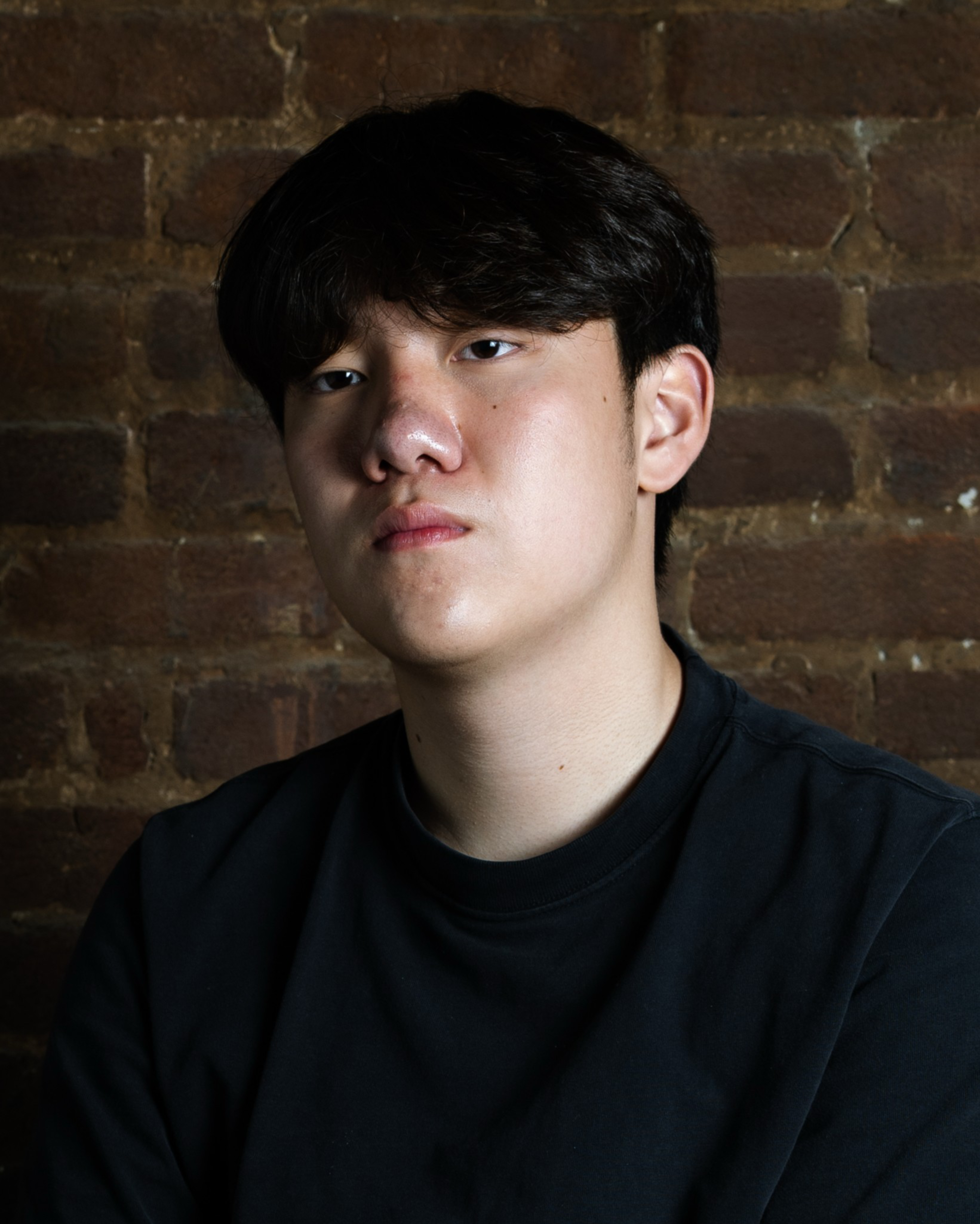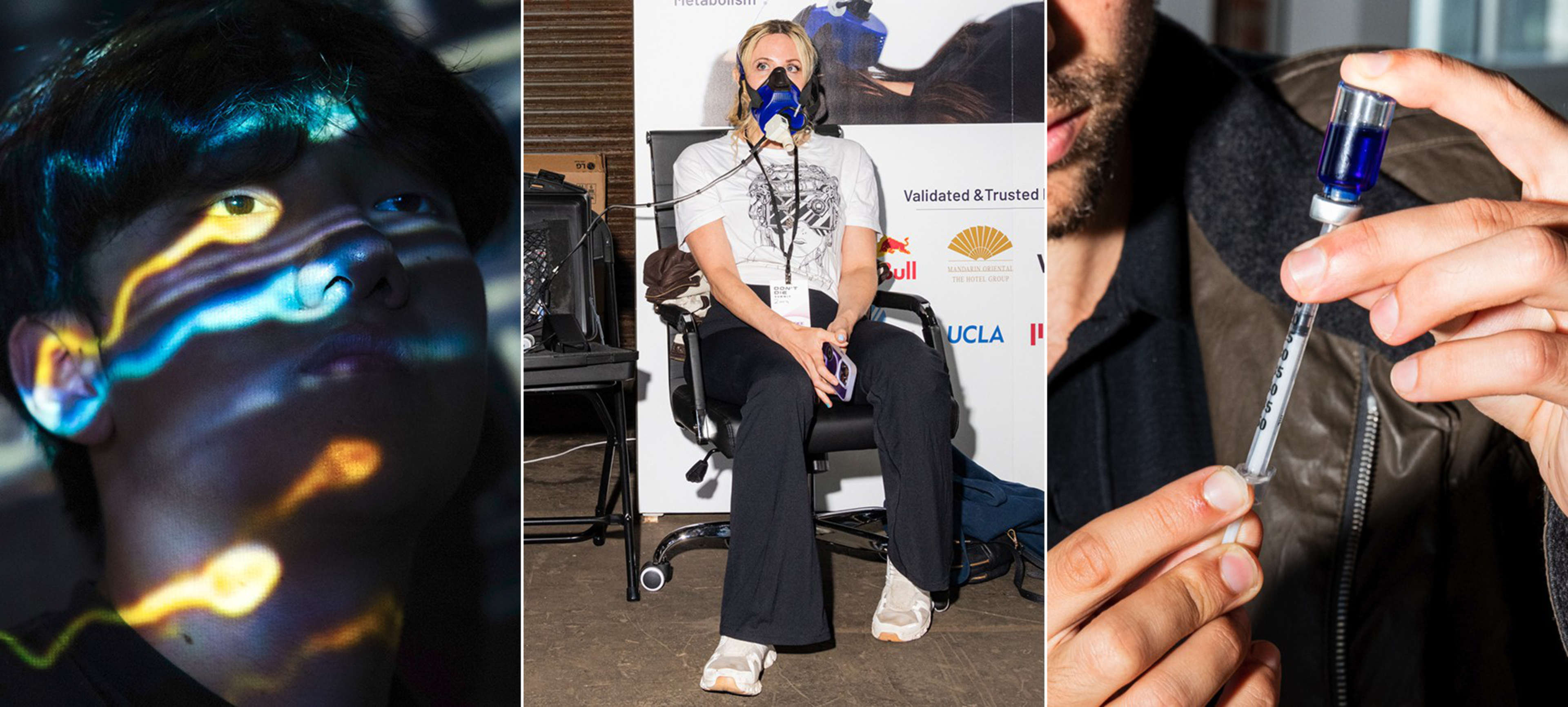Every person is born, lives, and dies. But to the new-school tech-bro, that’s just decel thinking: Dying should be optional.
Tech bros are taking the quest for immortality to new, potentially hazardous heights. Not content with red-light therapies, multivitamins, and cold plunges, they’re also injecting mysterious chemicals, developing nicotine addictions, and measuring the speed of their sperm. “I think the next version of the tech bro is to use some headband to modify and even increase sleep, or use some sort of compound to give you the short sleeper gene,” said Max Marchione, 25, cofounder of telehealth-for-longevity startup Superpower (opens in new tab).
Most of the nearly two dozen tech bros we surveyed were eager to try any and everything to extend their lives to infinity, while also optimizing their workable hours. Marwan Refaat, 25, an investor at Fractal Capital, takes a pill called Zest, which provides delayed-release caffeine after eight hours so he can wake up and be immediately ready to grind. And, lest a hormone imbalance hamper his productivity, he got a tattoo on his wrist that “glows red/green based on my hormone levels,” flagging him if something is awry.

Inside the lives of Silicon Valley’s young hustlers
Refaat jokingly described biohacking as a “slipperly slope.” You begin as a “fresh, wide-eyed” founder, then “start to realize that there are limitations to what you can do as a human.” Next, you “depend on external supplements, if you will, to boost your productivity.”
“You don’t realize that you’re becoming a technology brother up until you interface with people that are more well-adjusted,” he added.
To understand — and maybe even emulate — the tech bro’s pursuit of longevity, we gathered all the best, wackiest, and most controversial health tips from our survey takers.

WW(B)JD: What would Bryan Johnson do?
At Silicon Valley parties, drinking is out, and supplements are in.
“Every single party I go to serves a Bryan Johnson Blueprint Longevity Mix drink instead of a cocktail,” said One Chowdhury, 24, CEO of AI sales management startup Octolane.
The beverage — a blend of vitamins, minerals, and amino acids designed to boost energy and metabolism — is sold by “don’t die” messiah Bryan Johnson. A wealthy former tech executive turned anti-aging guru, Johnson claims to spend $2 million annually on his body in an effort to reverse the aging process.
While non-Silicon Valley types have ridiculed the 48-year-old’s waxy complexion and focus on “penile de-aging,” he has become an inspiration to tech founders looking to optimize their health and prolong their time on Earth. Many spend hundreds of dollars on products from his “longevity stack,” which includes creatine, pureed macadamia nuts, and a subscription-based meal delivery service.
Marty Kausas, cofounder and CEO of customer support platform Pylon, takes a shot of Johnson’s Snake Oil–branded olive oil each evening and invited a reporter from The Standard to join him. (Never again. It felt like being suffocated by a slimy animal.)
“I think Bryan Johnson is doing God’s work by treating himself as a guinea pig,” said Silen Naihin, 23, founder and CEO of AI sales startup Endflow. “The things he’s trying, you can’t legally do on someone else. His skin is literally in the game.”

Inject yourself with Chinese chemicals
Each week, Superpower hosts a companywide “Peptide Friday.” Alongside strategy updates and team shoutouts, the leaders dole out alcohol wipes and peptide syringes. Thymosin alpha-1, a peptide that purportedly boosts immunity, is a crowd favorite. “It started as a joke, but it was popular so we continued it,” said Marchione.
The popularity of GLP-1 drugs like Ozempic have turned peptides from a scientific curiosity into a household name for tech bros. The chemicals are short chains of amino acids that nudge cells to do everything from regulate appetite to repair tissue. Fans rave about BPC-157 for tendon healing, GHK-Cu for skin, and Semax for focus. Injectables are cool again in Silicon Valley. Use of a syringe, even as part of a sanctioned work event, is commonplace. The delivery mechanism is considered the gold standard for efficacy because it bypasses digestion and delivers more predictable effects.
Marchione started peptides a few months ago but now spends $1,000 on his monthly stack. None are FDA approved. “I get them from a Chinese peptide dealer,” he said, and they arrive with “research use only” labels attached. “All that matters is if I increase performance, even if it introduces a bit of short-term risk.”
That risk is part of the reason Michael Carter launched Finnrick, (opens in new tab) a peptide testing platform that grades vials for purity. Finnrick doesn’t exactly make Chinese peptides safe, but he at least makes the risk legible. “Everyone has a peptide guy,” said Carter. “What people need is transparent information so they can make their own decisions.”

Don’t smoke cigs — but do nicotine daily
If you see Marchione sucking on a lozenge, know that it’s not a cough drop; it’s nicotine. “I don’t think I’ve ever had a cigarette in my life,” he said. “And at the same time, I’ve used nicotine hundreds of times.”
Like several other tech bros we interviewed, Marchione takes nicotine like he would any other supplement. Research (opens in new tab) has shown that the drug lowers the risk of developing Parkinson’s disease, and one study (opens in new tab)showed that nicotine use could lead to improved memory and attention.
Tech bros saw this scientific evidence (highlighted by popular blogger (opens in new tab) Gwern Branwen) and ran with it. Instead of sparking up a cigarette, they stock up on Zyn pouches, even making the product into merch. “I’m seeing a lot of startup- and VC firm-monogrammed stainless-steel Zyn cases,” said Josh Constine, a tech journalist-turned-investor.
The studies may be promising, but nicotine as a health supplement remains strictly experimental. Still, where some reach for a morning coffee, Refaat recommends a nicotine patch. Just don’t forget to take it off.
“Yesterday, I wasn’t going to sleep, and I didn’t know why,” he laughed. “And then I was like, ‘Oh, I have a nicotine patch on.’”

Take careful care of your semen
Eric Zhu spends his weekends injecting sperm onto a race track and has somehow turned that into a job. The 18-year-old is the founder of Sperm Racing, a health and entertainment company on a mission to turn male fertility into F-1 style competition. It might sound ridiculous, but, in Silicon Valley, it’s a plausible path to riches.
The tech industry writ large has developed a fixation on male fertility, with topics like sperm motility becoming polite dinner-party conversation. The interest was spurred by a widely cited 2017 study (opens in new tab) that found that sperm counts in Western countries were down by as much as 60%. Influencers like Johnson and Andrew Huberman (opens in new tab) now treat sperm count as a reflection of overall health: It declines with unhealthy lifestyles and skyrockets with sleep, sobriety, and a constant ice pack on your balls. “If your computer is on your lap now, remove it,” Johnson has written. (opens in new tab) “Keep those boys cool.”
Tech bros have capitalized on the trend. Zhu raised $10 million to race sperm and promote male fertility, and startup Legacy raised $7.5 million to test and freeze sperm. Both Zhu and Legacy founder Khaled Kteily want to encourage men to take care of their swimmers. “We’re taught that infertility is a women’s issue, but infertility is just as likely to come from the male partner as the female partner,” Kteily told Forbes (opens in new tab).
This is especially prevalent for tech bros: Most told us they want at least four children. They’ll just have to make some sacrifices first. “I used to go to the steam room every single morning,” Zhu said. “But then it’s bad for my sperm.”

Spend thousands on sleep
The era of tech bros glorifying all-night coding sessions is sunsetting. Now, it’s all about the quality of your shut-eye and bragging about your sleep score.
“You probably have to wear an Oura ring to be a tech bro,” said Jaspar Carmichael-Jack, 24, CEO of AI sales agent startup Artisan. The smart ring, which continuously monitors the wearer’s health, exercise, and sleep, costs between $300 and $500, depending on the style and finish, plus a $6 monthly subscription fee.
More than half the tech bros we interviewed said they wear an Oura ring or Whoop band with similar health tracking features. They reported that the wearables encourage less drinking, more exercise, and consistent sleep. One bro admitted, though, that he bought his Oura to keep tabs on his energy-drink addiction.
“I just wanted to make sure my heart wasn’t getting screwed up, because I drink a lot of Red Bull,” said Jackson Denka, founder and CEO of trading and finance platform Azura.
But in optimization-obsessed Silicon Valley, merely tracking sleep isn’t enough. Eight Sleep, a sleep enhancement system beloved by Formula One drivers, Mark Zuckerberg, and, no surprise, Johnson, is a staple for tech bros graduating from a mattress on the floor of a coworking space.
The company’s flagship Pod is a smart mattress cover that has sensors, water channels, and climate control hardware. Based on your sleep stage, heart rate, and breathing patterns, the Pod adjusts its temperature and firmness.
Eight Sleep pods cost more than $5,000, but rest easy: A few tech bros reported that they got them for free during Y Combinator by signing up with financial services software Brex.
